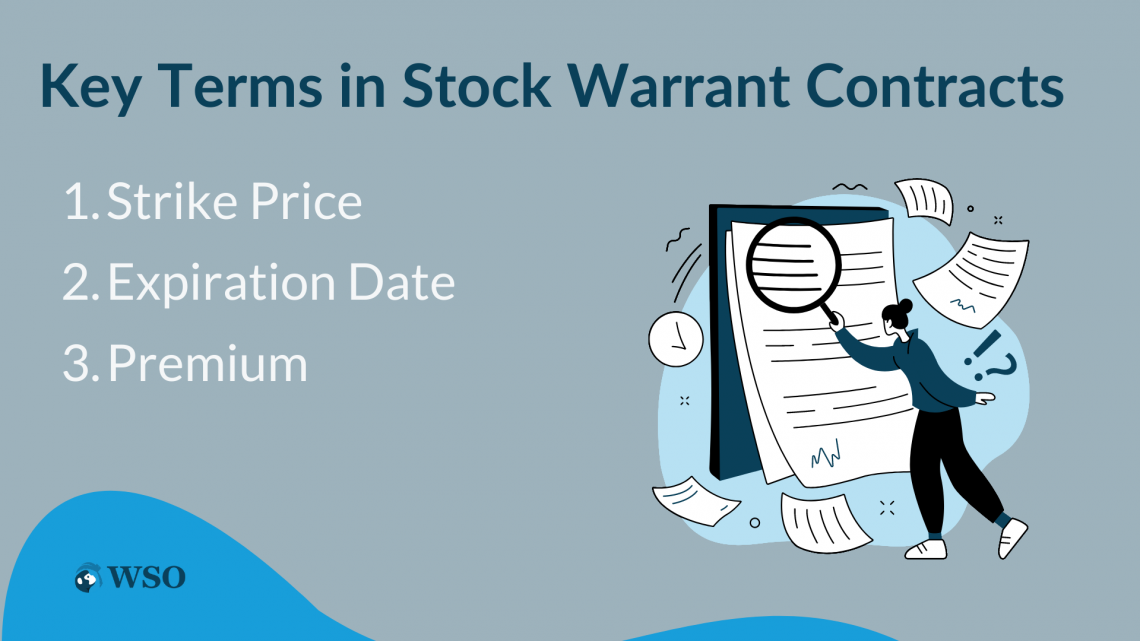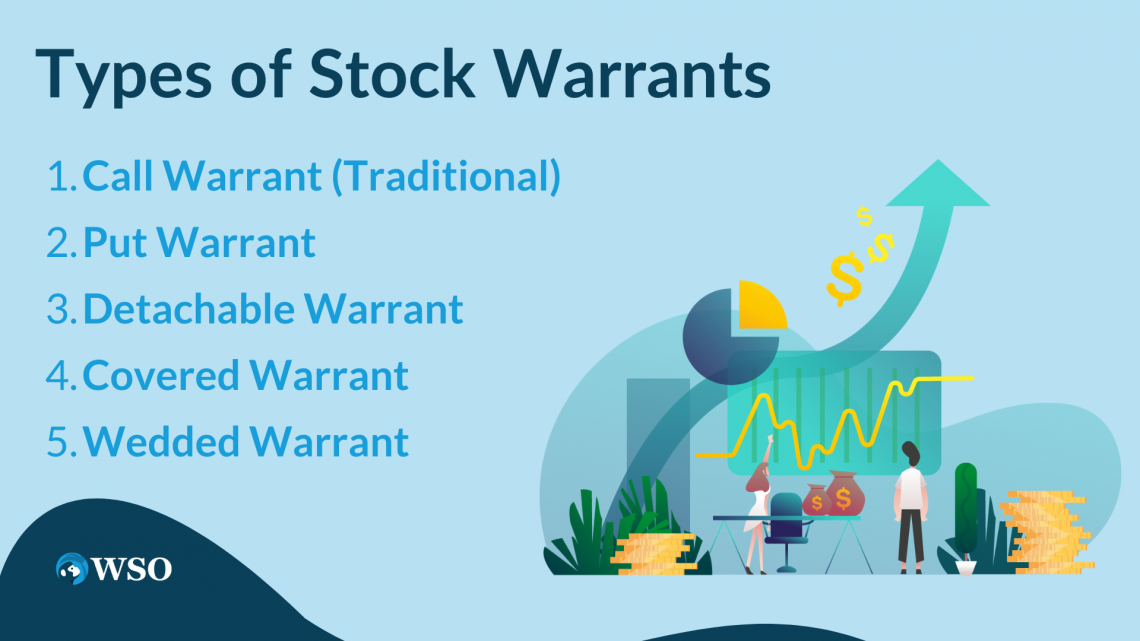Stock Warrants
A derivative agreement between a publicly traded corporation and an investor is a stock warrant.
What Are Stock Warrants?
Stock warrants are derivative instruments issued by a corporation. In these contracts, investors have the right but not the obligation to trade the company's shares at a predetermined price within a specific time frame.

The two parties concerned incorporate the organization and the investor. Although a stock warrant is comparable to a stock option, some critical distinctions exist. The article discusses these distinctions further.
An investor benefits when the underlying stock price crosses the warrants price. This appeals to the investor to redeem the warrant. In addition, the company benefits from increased equity, which can speed up the company’s earnings.
Redeeming a stock warrant indicates that a company issues a new share. This new share dilutes the existing shareholder's equity; hence, warrants are dilutive. As per GAAP, a warrant to buy a stock is considered an equity instrument.
These instruments are still used in China, Germany, and elsewhere. But, over time, it has lost its appeal in the United States.
Key Terms in Stock Warrant Contracts
There are certain keywords mentioned in a typical warrant contract. It is advised for an investor to be familiar with these terms before undertaking a contract as they impact the warrants’ future returns.

These are mentioned below:
1. Strike Price
The strike price is the exercise price at which the investor can sell the share once redeemed. From a rational point of view, a lower strike price would make the warrant more attractive. A high strike price is advantageous for a put option. It can also be called the warrant price.
2. Expiration Date
The expiration date is the last date on which a warrant can be exercised. In the event that the redemption date has passed, the investor will not be able to redeem the contract as it automatically expires.
Any investment with a term structure that is more long-term becomes riskier as it approaches its expiration date. The higher the risk, the greater the reward. Therefore, warrants with long-term structures have a higher value than warrants with short-term structures.
3. Premium
An investor must pay a fee to receive a warrant. However, the cost is small and subjective to factors that affect the stock warrant. Some factors include the strike price, time to maturity, risk, market conditions, etc.
A Stock Warrant Example
Company ABC has recently announced its plans to expand globally. Accordingly, they wish to issue stock warrants to support its expansion.

The company offers warrants at $5 for its stock that can be redeemed at any time over the next two years. The strike price, in this case, is $5, and it expires in two years.
The share currently trades at $2. Analysts suggest it could rise to $10 if the expansion is profitable. Suppose an investor purchases the offer for a fee/premium of $0.1 for 100 shares. Thus, the investor pays $10 today.
After two years, the share is trading at $10 since the expansion was a success. Finally, the investor decides to redeem his warrant and purchases 100 shares for $500.
Since the share is worth $1,000 now, the investor immediately gains $500. After deducting the $10 fee, the investor pockets a net gain of $490.
Types of Stock Warrants
Let us go over the different types of stock warrants that can be issued:

1. Call Warrant (Traditional)
These are the most commonly found ones in the market. They give the investor the right, but not the obligation, to buy a share at a specified price during a specified period from the company.
It is most beneficial to exercise the warrant once the trading stock price exceeds the predetermined strike price.
2. Put Warrant
They give the investor the right, but not the obligation, to sell a stock at a specified price during a specified period back to the company. However, companies do not usually offer this instrument as it acts like a negative bet on the company's share.
Note
It is most beneficial for an investor to sell the stock once the current trading price is lower than the predetermined strike price.
3. Detachable Warrant
They provide the flexibility to the investor to sell the warrant without actually selling the bond or stock it was initially attached to.
4. Covered Warrant
These are only issued by financial institutions. Companies give financial institutions like banks the right to issue stock warrants. They are also called detachable warrants.
The company issues no new shares once the warrant is exercised as the institution must have already acquired a share of the company or would be able to be a shareholder easily.
5. Wedded Warrant
These are issued by a holding company attached to a certain debenture, like a bond or preferred stock.
The exercise of these warrants includes selling the warrant itself and the attached debenture. Accordingly, they are also called non-detachable warrants.
There are also two kinds of warrants based on the redemption period:
- American-style warrants can be exercised at any time before or on the expiration date.
- European-style warrants can be exercised only on the expiration date.
Generally, companies prefer to offer American-style warrants. However, sometimes both features can be combined together.
Why Are Stock Warrants Created by a Company?
There are numerous reasons why a company might be interested in issuing warrants. They are listed below.

a) Raise Capital
With the announcement of a warrant, potential investors might be attracted to investing in the company. Moreover, since these are traded on OTC, the news could be widespread across the market, forming a better reach.
b) Employee Benefits
The company might use stock warrants as an incentive to retain existing employees and acquire new ones.
Notably, using a European-style warrant would be beneficial as the employee can only exercise it at the end of the contract. This creates a long-term incentive for the employee to work with the company to reap the benefits of the warrant.
c) Fund Acquisitions
The company may issue stock warrants while funding an acquisition. The company
would give these warrants in addition to cash.
d) Attract investors to purchase bonds or preferred stock
A company could alleviate a bond or preferred stock deal by inciting investors through stock warrants. By attaching a stock warrant to a bond, the investor could benefit further from a rising share price, and it compensates for the risk undertaken.
For example, XYZ company issues a bond with warrants attached. The bond is worth $200, and the warrant states that the investor could purchase 50 shares for $20 in two years. The investor benefits when the share price rises above $20.
e) Potential Liberators from Bankruptcy
Destitute companies could issue warrants to secure a future source of income. It acts as a relief and pushes companies to survive and flourish.
Stock Warrants vs. Stock Options
Options are derivative contracts where the buyer has the right, but not the obligation, to buy the underlying stock from the seller for a specific price during a particular time frame. This definition is similar to a stock warrant.

Like stock warrants, even options contracts can be a call or put. Call options are a right to buy, and put options are a right to sell. Note that even these contracts are not an obligation to the buyer.
However, a few key differences in their features:
1. Counterparties
The parties in a stock warrant contract include a company and an investor; however, both parties are generally investors in a stock options contract.
2. Raising Capital
Since the company deals with warrants directly, a redemption indicates that the company has gained capital. On the other hand, redeeming an option contract does not provide the company with more capital as the trade is between investors only.
3. Time to maturity
Warrant contracts have medium to long-term maturity. In contrast, option contracts have a short-term maturity period.
4. Shareholders' equity
By redeeming warrant contracts, the company issues a new share, increasing the equity of the company. On the other hand, the stocks underlying the options contracts can already be found on the market.
The shareholder's equity is not affected when options contracts are executed. However, the seller of options contracts must hold the underlying share throughout the option duration.
Application of Tax in Stock Warrants
Tax exemptions are not available to warrant holders since they are not company shareholders. The investor's income from the exercise of warrants is taxable if he or she owned the shares previously.

Taxable income is calculated as the difference between the current share and strike prices, with fewer expenses. The taxable income is treated as a capital gain, and a capital gains tax is levied.
For example, when an investor buys a warrant of $50 and exercises it when the stock price is $80, a $30 profit is pocketed. It is this $30 that would be taxed as a capital gain.
If the investor did not hold the stock before its exercise, the income generated is treated as ordinary income. Therefore, a capital gains tax would not be levied on the income generated.
However, the investor must continue to pay their ordinary income tax on the gains. As a result, options are treated slightly better than stock options regarding taxation.
Merits and Demerits of Stock Warrants
Like every other investment, even warrants have their own merits and demerits.
A) Merits
Let us begin by specifying the advantages of warrant contracts.
A warrant represents a “Spend Less, Earn More” strategy. Therefore, the initial cost of purchasing a warrant is minimal compared to the possible earning potential.
To gain perspective, let’s take a look at our example. The premium was only $0.1 per share for a strike price of $5. It would have cost much more to buy one share from the market, i.e., $2.
In this case, the gearing ratio is $5/$0.1= 50. The gearing ratio is the financial leverage that an investor holds. The ratio is proportionate to an investor's profit rate. Therefore, the investor's profit rate is also high when the ratio is high.

Warrants represent an asset in bullish markets. It has a good Return on Investment. On the contrary, a warrant would provide security in bearish markets. The maximum loss would be to the extent of the premium paid.
It is also advantageous to purchase bonds that provide attached warrants. It acts as a diversification tool. Additionally, the value of the stock warrants would be higher than the interest investors could reap from the bond alone.
B) Demerits
Let us take a look at the disadvantages of warrant contracts:
Warrants only provide the right to be a shareholder and do not represent any ownership of shares. Therefore, investors that hold warrant contracts are not treated with the benefits of being a shareholder. This includes not receiving any dividends and having no voting rights.
Warrants have an expiration date that could last for a long-term period. Therefore, an investor needs to closely monitor the market conditions during this period and decide whether holding the contract throughout the duration will be beneficial.

Additionally, investors do not receive any interest from the warrant. Therefore, the interest on the bonds is generally lower for wedded contracts.
Warrants have also been less popular in recent times. This is because the markets have low volumes, and finding a suitable warrant with a good value may take time and effort.
The risk goes hand-in-hand with any investment. Warrants are risky instruments as there is a potential that the stock price would not go in the desired direction.
There is always a downside risk for any stock. For example, if the share price drops rapidly, the warrant will not have any redemption value during its duration.
Risks and Other Considerations
This section discusses the risks that would impact a stock warrant. It also includes the other considerations an investor must look at before investing in a warrant.

A) Risks
An investor should thoroughly consider all the above aspects before investing in a stock warrant.
The most evident risk is market risk. The risk that abrupt price movements are triggered is called market risk.
It is always possible that an investment could potentially lose all its value owing to the market. Warrants also work similarly, depending on the company's performance and market conditions.
There is a default risk for the covered warrants that financial institutions issue. This is because they may default on their obligation to reimburse the investor.
Lastly, as the market for warrants has less volume, finding a counterparty could be tedious.
B) Other Considerations
A detailed study should be undertaken to understand the market conditions. There will be times of uncertainty in investing, and the investor should be prepared to deal with these situations.
Changes in the market might affect the stock and the warrants' potential returns in the future.
The investor must select the warrant they believe matches their risk appetite. They should consider the strike price, end date, premium, and returns. The returns can be computed using specific financial models like Black-Scholes Model.
Additionally, the investor must understand the terms and conditions mentioned in the warrant agreements. Again, a broker can assist you in this process.




or Want to Sign up with your social account?